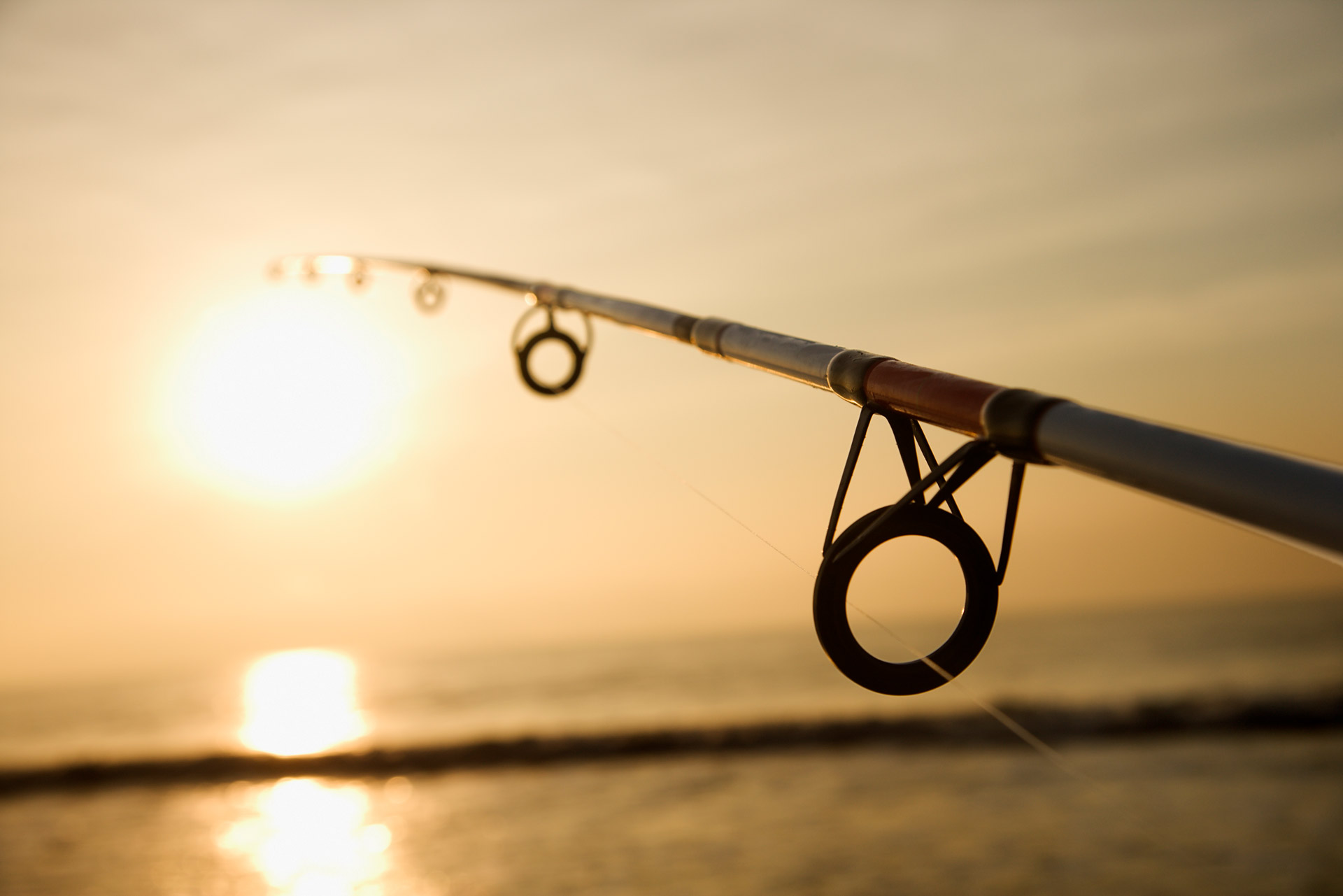How to Get Bass to Bite: Become a Master Angler Today
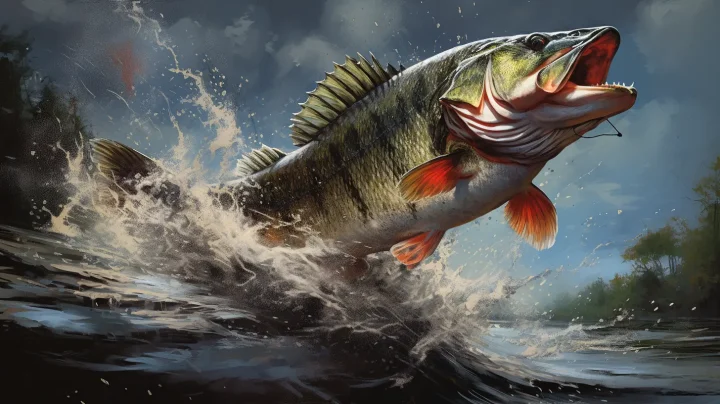
Are you tired of casting your line into the water only to be met with silence from those elusive bass? Well, fear not! This article is here to guide you through the secrets of getting those bass to bite.
We'll show you how to change up your retrieval pattern and lures, explore different positions in the water column, and even break away from routine fishing.
With these tips and techniques, you'll be reeling in bass like a pro in no time.
So grab your gear and get ready to hook some big ones!
Key Takeaways
- Change up your retrieval pattern and lures to entice bass.
- Adjust your position in the water column to target active fish.
- Explore different locations to find where the fish are.
- Vary your presentation and mimic the behavior of natural prey.
Changing Retrieval Pattern and Lures
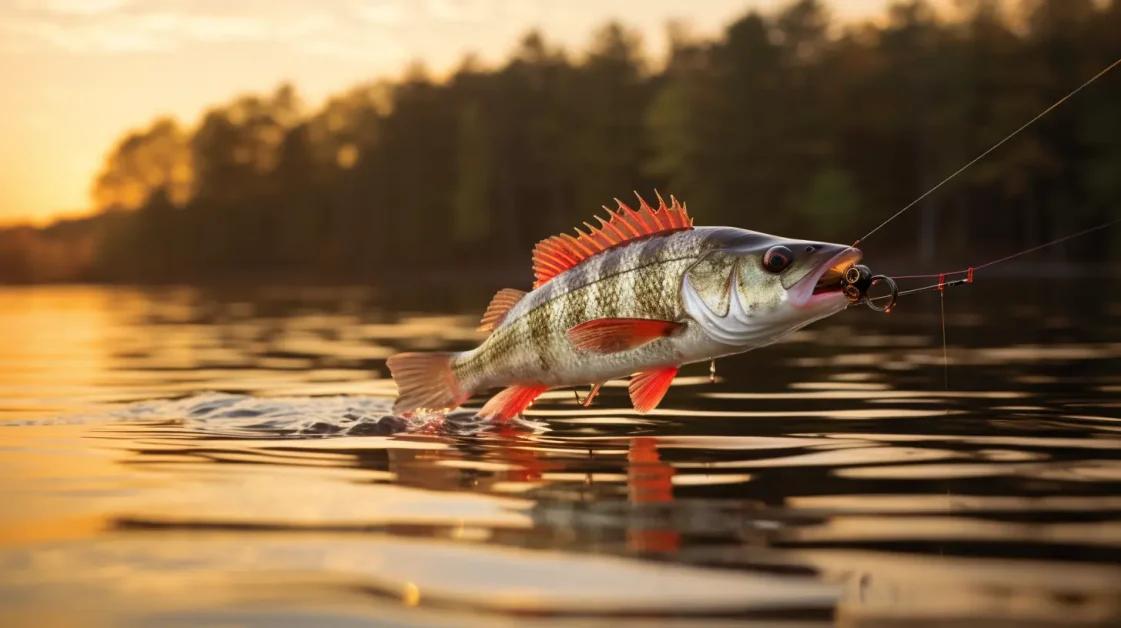
Switch up your retrieval pattern to entice the bass and don't forget to make small adjustments to your lure choice as well. When it comes to catching bass, it's important to vary your approach in order to increase your chances of success.
One way to do this is by trying different lure colors for bass. Bass are attracted to different colors depending on the conditions, so experiment with a variety of hues to see what works best for you.
Additionally, adjusting retrieval speed can make a big difference in enticing bites. Sometimes a slow retrieve with short pauses can do the trick, while other times a fast and erratic retrieve may be more effective. Don't be afraid to try different bait movements either, such as twitching or jerking the lure, as these actions can mimic natural prey and trigger a reaction from the fish.
If all else fails, consider using live bait effectively. Live bait can often be irresistible to bass and increase your chances of getting bites.
Lastly, utilizing sonar for bass fishing has its benefits. Sonar technology allows you to locate fish more easily by providing detailed information about their location and depth in the water column, helping you target them more effectively.
Changing Position in the Water Column
Adjusting your fishing depth in the water column can increase your chances of attracting bass. When targeting bass, it's important to consider their preferred position in the water column and adjust accordingly. Techniques like vertical jigging, drop shotting, deep diving crankbaits, Carolina rigging, and suspending jerkbaits can help you effectively change your position in the water column.
Vertical jigging involves using a weighted lure that is dropped straight down into the water and then lifted up and allowed to fall back down. This technique allows you to target specific depths where bass may be holding.
Drop shotting is another effective method for adjusting your fishing depth. It involves using a weight at the bottom of your line with a hook and bait suspended above it. By varying the length between the weight and bait, you can fish at different depths in the water column.
Deep diving crankbaits are designed to reach deeper depths than traditional crankbaits. By retrieving these lures at different speeds and depths, you can cover a wide range of the water column to entice bass.
Carolina rigging is a technique that utilizes a sliding weight on your line above a hook and bait. By adjusting the length between the weight and bait, you can fish at various depths within the water column.
Suspending jerkbaits are effective for fishing mid-water depths. These lures suspend in place when paused during retrieval, making them perfect for enticing bass that are holding off bottom or near structure.
Changing Location
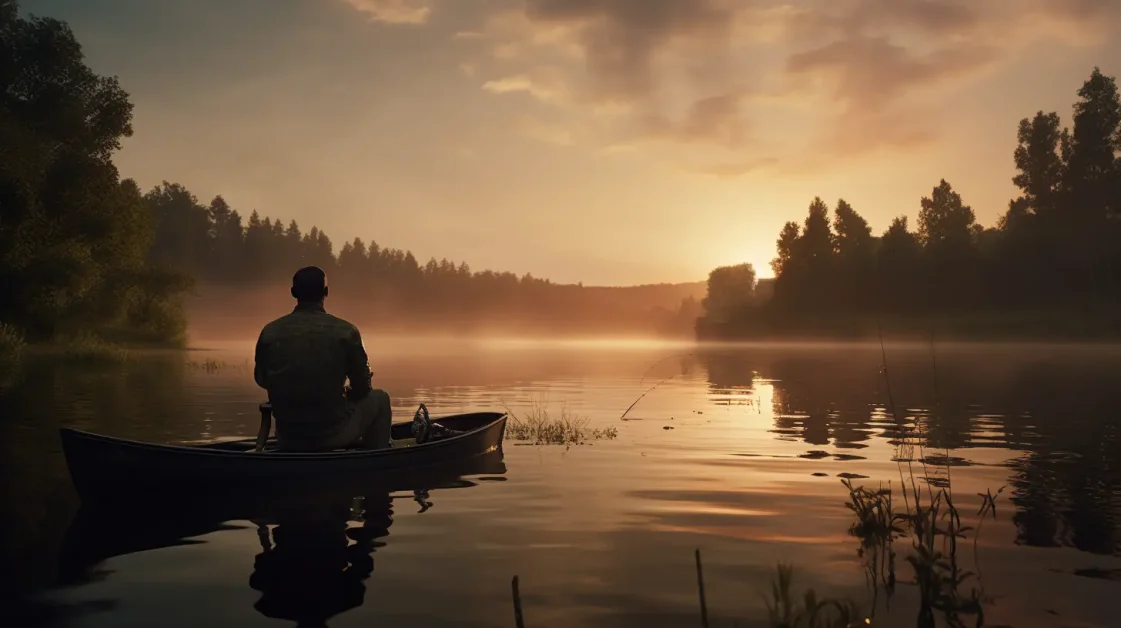
Don't rely on fishing the same spot repeatedly, as fish move around and exploring different locations can lead to finding active bass. Exploring new fishing spots is key to increasing your chances of success.
By adapting to changing conditions and being willing to try different areas, you can discover where the bass are actively feeding. When exploring new spots, it's important to experiment with different baits and techniques to find the best bait for that particular location.
Furthermore, maximizing your casting frequency by making multiple casts in each spot can increase the odds of your bait being in front of a roaming bass.
Lastly, don't be afraid to use unconventional techniques or baits if traditional methods aren't producing results. Remember, being adaptable and open-minded is crucial when searching for those elusive bites.
Changing Presentation
Vary the speed and action of your lure to keep the fish interested and increase your chances of triggering a reaction. Experiment with different bait movements to make the fish react.
Adapting to fish behavior is crucial in changing your presentation. Don't be afraid to use unconventional baits in certain situations, as fish can still react to baits even when they're not hungry. Trust your instincts and use baits that you believe will work in a specific area.
Activating and catching fish requires making them more receptive to a different bait by agitating them with one bait first.
Lastly, try using the fleeing and wounded prey presentations. Mimicking fleeing baitfish or making your lure look wounded can trigger the feeding instinct of bass, especially when fishing in high-percentage areas like weeds or docks.
Changing Fishing Time
Experiment with different times of the day to increase your chances of success when fishing for bass. Timing plays a crucial role in bass fishing, as they tend to be more active during certain periods.
Here are three key factors to consider when choosing the right time to catch bass:
- Best time to fish for bass: Early morning and late evening are generally regarded as the optimal fishing times for bass. During these periods, the water is cooler, and bass are more likely to be actively feeding.
- Optimal fishing times for bass: Pay attention to the feeding periods of bass, which typically occur at dawn and dusk. Bass are known to be most active during these windows, making it an excellent opportunity for a successful catch.
- Timing strategies for bass fishing: Experiment with different weather conditions and monitor how they affect bass behavior. For example, overcast days or light rain can trigger increased activity among bass. Additionally, keep track of water temperatures and adjust your fishing time accordingly.
Additional Tips and Techniques
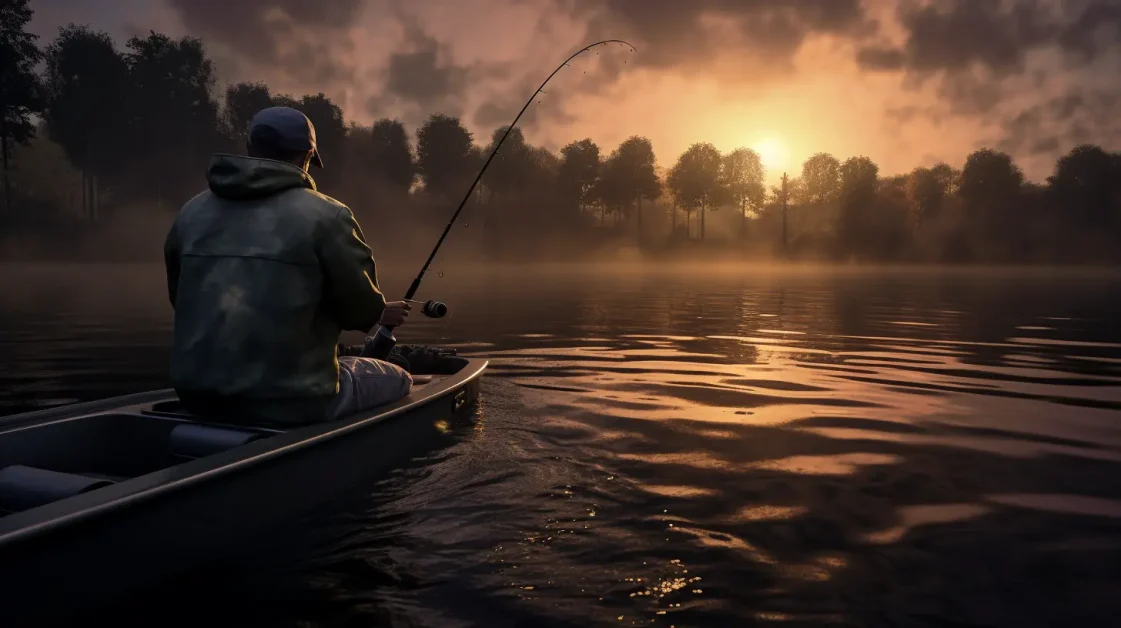
Using a variety of lures can help increase your chances of success when fishing for bass. One technique is using live bait, which can be highly effective in attracting bass. Live bait such as minnows or worms can mimic the natural prey of bass and entice them to bite.
Additionally, utilizing different fishing techniques can also improve your results. Varying your retrieval pattern, adjusting the position in the water column, and changing your presentation can all make a difference in enticing bass to strike.
Furthermore, using sonar technology can provide benefits by helping you locate fish more accurately. Different lures, such as crankbaits or jerkbaits, offer versatility in triggering bites from bass.
Lastly, considering different weather conditions and adapting your fishing strategies accordingly can greatly enhance your chances of success on the water.
Varying Retrieves
Mix up your retrieval pattern by incorporating different movements and speeds to entice the bass. The key to getting bass to bite is to constantly change your bait movements, keeping them guessing and enticing them to strike.
Here are three ways you can vary your retrieve:
- Experiment with different bait movements: Try twitching, jerking, hopping, or grinding the bait to mimic the behavior of natural prey. Changing the movement pattern can trigger a reaction from the bass.
- Use unconventional baits: Don't be afraid to try something different. Fish can still react to baits even when they're not hungry. Use baits that create noise and commotion or trust your instincts and use baits that you believe will work in a specific area.
- Maximize casting frequency: Increase your chances of attracting a fish by making multiple casts in one spot using different lures. Bass are constantly moving, so saturating the area with multiple presentations increases the odds of getting a bite.
Avoiding Routine Fishing
Now that you've learned about the importance of varying retrieves, let's discuss the next strategy for getting bass to bite: avoiding routine fishing. Bass can be unpredictable creatures, and sometimes sticking to the same old techniques just won't cut it. To catch their attention, you need to break out of your comfort zone and try something different.
One approach is using burned bait or violently ripping your lure to catch the fish's attention. By making the bait go erratic, you can provoke a reaction from the bass. Additionally, don't be afraid to use unconventional baits in certain situations. Fish can still react to baits even when they're not hungry.
Trust your instincts and use baits that you believe will work in a specific area. Fishing is not just about following a set formula; it's about adapting your techniques to match the conditions and trigger those fishing instincts in bass.
Another tip is saturating the area by making multiple casts. Recognize that fish are constantly on the move, so increase your chances of attracting a fish by covering different spots with various lures. Play the odds and increase your casting frequency.
Lastly, don't be afraid to break away from routines and experiment with varying techniques. Constantly change fishing techniques if what you're currently doing isn't producing any bites. Fish outside of your comfort zone and try different approaches.
Saturating the Area
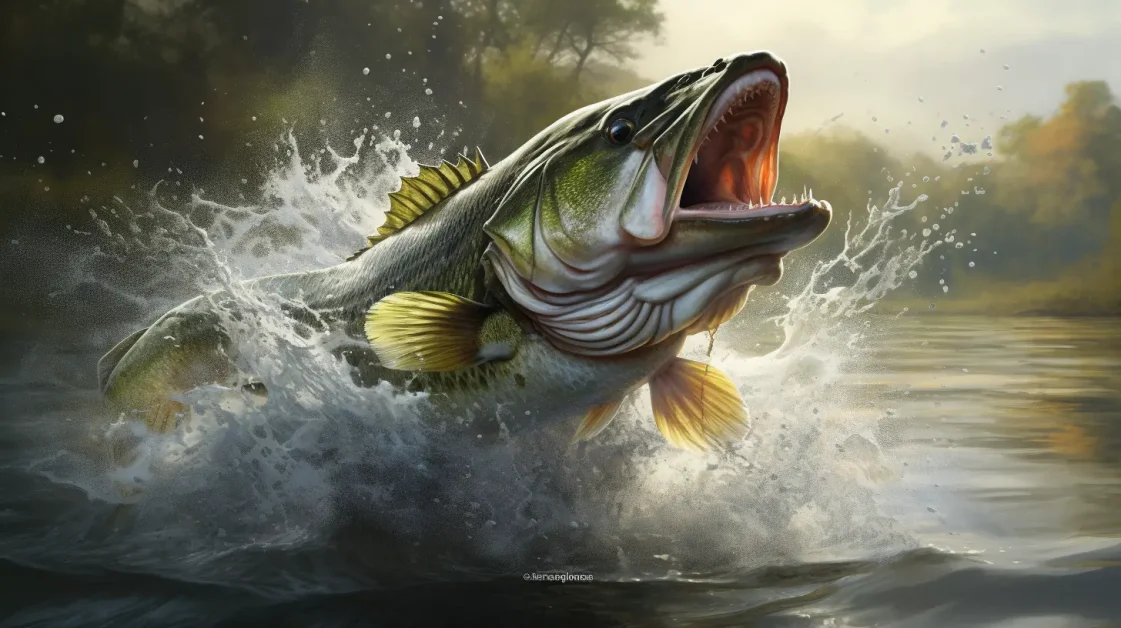
To increase your chances of attracting a fish, try saturating the area by repeatedly casting with different lures. This technique can be highly effective in enticing bass to bite. Here are three key points to keep in mind:
- Using multiple lures: By using a variety of lures, you're able to present different colors, sizes, and movements to the fish. This increases the likelihood of triggering their instinctive feeding response.
- Casting frequency: Make sure you cast frequently and cover as much water as possible. Fish behavior can change throughout the day, so it's important to consistently present your bait in different areas to maximize your chances of success.
- Unconventional baits: Don't be afraid to think outside the box and use unconventional baits that may not typically be associated with bass fishing. Sometimes, these unexpected offerings can elicit strong reactions from bass and result in successful bites.
Breaking the Norms
Don't be afraid to step outside your comfort zone and try unconventional baits in certain situations; you might be surprised by the results.
When it comes to getting bass to bite, thinking outside the box can pay off big time. Instead of relying solely on traditional lures, consider using unconventional baits that trigger instinctive reactions in bass.
For example, imitating fleeing baitfish can elicit a feeding response from bass. Try using soft plastic jerkbaits and Texas rigging them weightless to create a skipping motion across the water's surface.
Another effective approach is presenting wounded prey. Mimic a wounded sunfish by slowly pulsing a swim jig and trailer through high-percentage areas like weeds, docks, and laydowns.
Using the One-Two Combination
When using the one-two combination, you can activate a school of fish with one bait and then switch to another bait to increase your chances of catching them. This technique combines different strategies to maximize bait effectiveness and increase your success in bass fishing.
Here's how it works:
- Combining techniques: By using a sequential lure approach, you can target different behaviors and preferences of bass. Start with a bait that attracts attention or triggers aggression, such as a crankbait or topwater lure. Once the fish are interested and agitated, switch to a different bait that mimics their natural prey or matches their feeding patterns.
- Bait switching strategies: Experiment with various lures and presentations to find what works best for the conditions and the fish's behavior. Switching between different types of baits like jerkbaits, crankbaits, or soft plastics allows you to cover more ground and entice the bass from different angles.
- Dual bait presentations: Use a combination of baits simultaneously to offer contrasting movements or profiles in the water. For example, you can use a fast-moving spinnerbait along with a slow-sinking soft plastic worm on separate rods. This dual presentation increases your chances of triggering bites by appealing to multiple senses of the bass.
Reaction Strikes and Lures
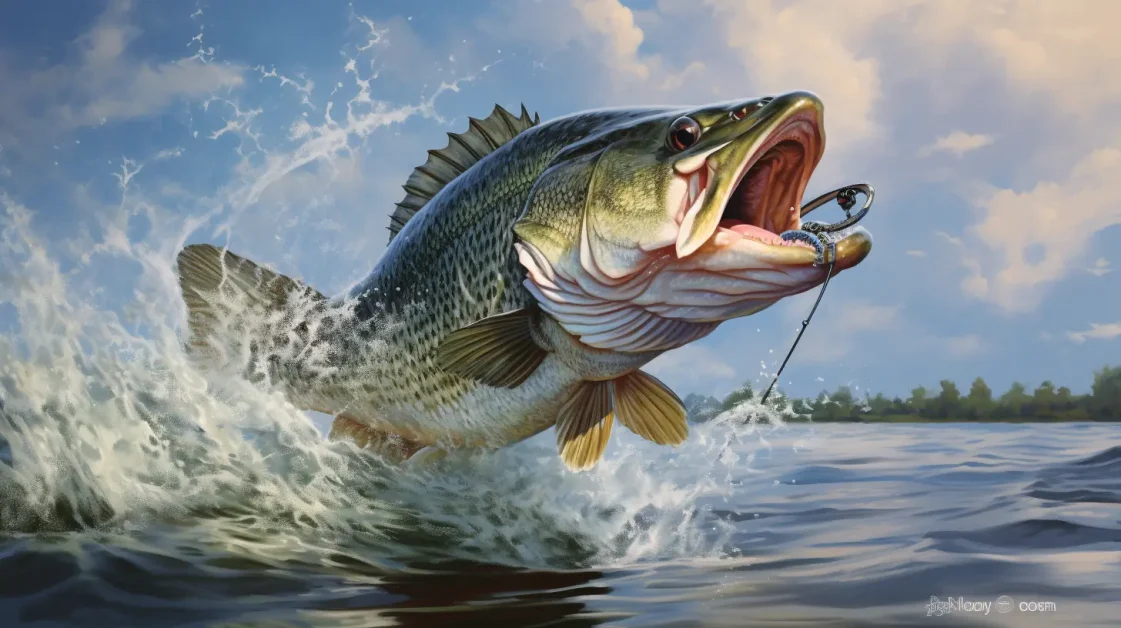
Using the one-two combination of different lures can increase your chances of triggering a reaction strike from bass.
When it comes to effective baits for reaction strikes, there are several options to consider. Lures like suspending jerkbaits, square-billed crankbaits, and Texas rigged plastics with heavier weights have proven to be successful in eliciting reaction strikes from bass.
Another technique is mimicking fleeing prey, which triggers the feeding instinct of bass. Soft plastic jerkbaits are ideal for this presentation, allowing you to mimic the movement of fleeing baitfish.
Lastly, triggering the feeding instinct with wounded prey presentations can be achieved by using a slow and pulsing motion with a swim jig and trailer, imitating a wounded sunfish.
It's important to experiment with different techniques for non-feeding bass and find what works best for your fishing conditions.
Frequently Asked Questions
What Are Some Unconventional Baits That Can Be Effective for Bass Fishing?
When it comes to bass fishing, sometimes you need to think outside the box. Unconventional baits like rubber frogs, spinnerbaits with trailers, or even a piece of hot dog can be surprisingly effective at enticing those elusive bites.
How Can I Increase the Odds of My Bait Being in Front of a Bass?
To increase the odds of your bait being in front of a bass, try increasing its visibility by using brighter colors or adding attractants. Change your presentation style and target specific depths. Also, fish during feeding times for better chances of success.
Are There Any Specific Techniques or Lures That Can Trigger a Reaction Strike From Bass?
To trigger a reaction strike from bass, try topwater tactics to imitate fleeing prey. Use jigging techniques and drop shotting tricks to entice bass in different water depths. Experiment with spinnerbait secrets and crankbait strategies for added success.
How Can I Mimic the Behavior of Wounded Prey to Entice Bass?
To mimic the behavior of wounded prey and entice bass, focus on bait effectiveness. Experiment with techniques like slow, pulsing motion with a swim jig and trailer. Vary your presentation to increase odds of triggering reaction strikes.
Can You Provide Any Tips for Fishing in High-Percentage Areas Like Weeds, Docks, and Laydowns?
To fish in high-percentage areas like weeds, docks, and laydowns, try these tips: 1) Use weedless lures to avoid snags. 2) Flip or pitch your bait close to structure. 3) Experiment with different techniques like skipping or buzzing your lure. 4) Be patient and persistent to entice a bite.
Conclusion
In conclusion, by employing the strategies and techniques discussed in this article, you can significantly increase your chances of enticing bass to bite. Remember to vary your retrieval patterns and lures, experiment with different positions in the water column, and explore new fishing locations. Adapt your presentation accordingly and don't be afraid to break away from routine fishing practices and try unconventional baits. By doing so, you'll tap into the instincts of these elusive creatures and reel in those prized catches.
As they say, "With a little creativity and finesse, you'll have bass biting like there's no tomorrow!"



